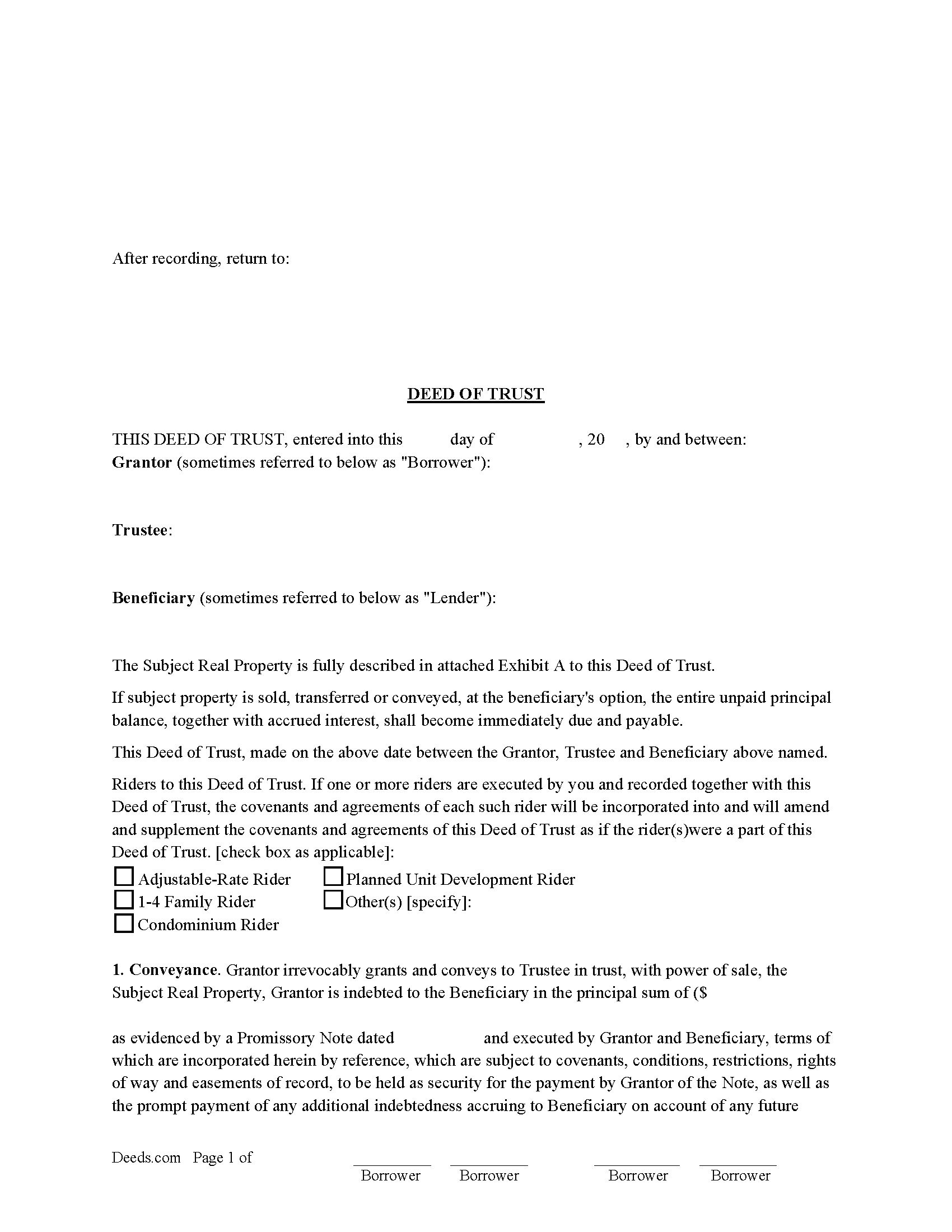Download Idaho Deed of Trust Legal Forms

Idaho Deed of Trust Overview

A Deed of Trust is the most common instrument used to finance real property in Idaho. A Deed of Trust with a power of sale allows for a non-judicial foreclosure, saving time and expense for the lender. A Deed of Trust/Promissory Note that include stringent default terms can be beneficial to the lender. Use these forms for financing real property: vacant land, residential property, rental units, condominiums, small commercial and planned unit developments.
The promissory note is held by the lender and used for reconveyance once the deed of trust has been satisfied, it is considered to be severable and addresses past due dates, late charges, fees for additional days late, maturity dates, traditional finance and balloon payments, default rates, default terms and conditions, etc.
45-1502. DEFINITIONS --- TRUSTEE'S CHARGE. As used in this act:
(1) "Beneficiary" means the person named or otherwise designated in a trust deed as the person for whose benefit a trust deed is given, or his successor in interest, and who shall not be the trustee.
(2) "Grantor" means the person conveying real property by a trust deed as security for the performance of an obligation.
(3) "Trust deed" means a deed executed in conformity with this act and conveying real property to a trustee in trust to secure the performance of an obligation of the grantor or other person named in the deed to a beneficiary.
(4) "Trustee" means a person to whom title to real property is conveyed by trust deed, or his successor in interest for the limited purpose of the power of sale contained in this chapter upon the occurrence of certain contingencies set forth in such trust deed, and the obligation to reconvey the deed of trust pursuant to section 45-1514, Idaho Code. All other incidents of ownership of such real property shall remain with the grantor. For the purpose of section 45-1506(2)(c), Idaho Code, a trustee is not a party requiring notice of sale.
(5) "Real property" means any right, title, interest and claim in and to real property owned by the grantor at the date of execution of the deed of trust or acquired thereafter by said grantor or his successors in interest. Provided, nevertheless, real property as so defined which may be transferred in trust under this act shall be limited to: (a) any real property located within an incorporated city or village at the time of the transfer; (b) any real property not exceeding eighty (80) acres, regardless of its location, provided that such real property is not principally used for the agricultural production of crops, livestock, dairy or aquatic goods; or (c) any real property not exceeding forty (40) acres regardless of its use or location.
(6) The trustee shall be entitled to a reasonable charge for duties or services performed pursuant to the trust deed and this chapter, including compensation for reconveyance services notwithstanding any provision of a deed of trust prohibiting payment of a reconveyance fee by the grantor or beneficiary, or any provision of a deed of trust which limits or otherwise restricts the amount of a reconveyance fee to be charged and collected by the trustee. A trustee shall be entitled to refuse to reconvey a deed of trust until the trustee's reconveyance fees and recording costs for recording the reconveyance instruments are paid in full. The trustee shall not be entitled to a foreclosure fee in the event of judicial foreclosure or work done prior to the recording of a notice of default. If the default is cured prior to the time of the last newspaper publication of the notice of sale, the trustee shall be paid a reasonable fee.
45-1504. TRUSTEE OF TRUST DEED --- WHO MAY SERVE --- SUCCESSORS.
(1) The trustee of a trust deed under this act shall be:
(a) Any member of the Idaho state bar;
(b) Any bank or savings and loan association authorized to do business under the laws of Idaho or the United States;
(c) An authorized trust institution having a charter under chapter 32, title 26, Idaho Code, or any corporation authorized to conduct a trust business under the laws of the United States; or
(d) A licensed title insurance agent or title insurance company authorized to transact business under the laws of the state of Idaho.
(2) The trustee may resign at its own election or be replaced by the beneficiary. The trustee shall give prompt written notice of its resignation to the beneficiary. The resignation of the trustee shall become effective upon the recording of the notice of resignation in each county in which the deed of trust is recorded. If a trustee is not appointed in the deed of trust, or upon the resignation, incapacity, disability, absence, or death of the trustee, or the election of the beneficiary to replace the trustee, the beneficiary shall appoint a trustee or a successor trustee. Upon recording the appointment of a successor trustee in each county in which the deed of trust is recorded, the successor trustee shall be vested with all powers of an original trustee.
Idaho Code 45-1003 -- Acknowledgment and Recordation Mortgages, and deeds of trust or transfers in trust of real property may be acknowledged or proved, certified and recorded, in like manner and with like effect as grants and conveyances thereof.
For use in Idaho only.